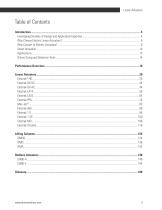
Catalog excerpts

Advanced Components for Industrial, Mobile and Structural Applications OSTHOMSON Linear Motion. Optimized7
Open the catalog to page 1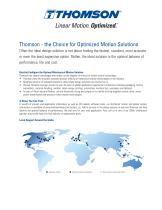
Thomson - the Choice for Optimized Motion Solutions Often the ideal design solution is not about finding the fastest, sturdiest, most accurate or even the least expensive option. Rather, the ideal solution is the optimal balance of performance, life and cost. Quickly Configure the Optimal Mechanical Motion Solution Thomson has several advantages that makes us the supplier of choice for motion control technology. • Thomson owns the broadest standard product offering of mechanical motion technologies in the industry. • Modified versions of standard product or white sheet design solutions are...
Open the catalog to page 2
Leveraging Decades of Design and Application Expertise The history of Thomson actuators goes back to the mid-1960s when American engineers used ball screws to build the first generation of electric linear actuators. These were developed for control of accessory drives on garden tractors and farm equipment. Since that simple beginning, actuators are now used in all types of equipment to automate processes, remove people from dangerous situations, provide remote control, and make difficult, tedious or manual jobs easier. The first electric linear actuators, designed for agricultural...
Open the catalog to page 4
Linear Actuators Today, Thomson is the market leader for electric linear actuators used in the most demanding applications, including construction and agriculture vehicles. We routinely collaborate with OEMs globally to solve problems, boost efficiency and enhance the value passed on to their customers. Call us today to discuss how our vast offering of standard or custom solutions can deliver the optimal balance of performance, life and installed cost for you and your applications. Thomson actuators help people every day at home or work, during commuting, or when visiting the doctor,...
Open the catalog to page 5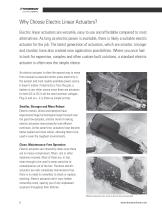
Why Choose Electric Linear Actuators? Electric linear actuators are versatile, easy to use and affordable compared to most alternatives. As long as electric power is available, there is likely a suitable electric actuator for the job. The latest generation of actuators, which are smarter, stronger and sturdier, have also created new application possibilities. Where you once had to look for expensive, complex and often custom-built solutions, a standard electric actuator is often now the simple choice. An electric actuator is often the easiest way to move from manual to powered motion since...
Open the catalog to page 6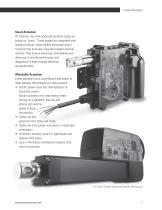
Linear Actuators Smart Actuation At Thomson, the most advanced actuators today are known as “smart.” These models are integrated with onboard controls, which enable enhanced control functions that previously required complex external controls. They feature enhanced controllability and allow you to monitor performance and diagnostics to help increase efficiency and productivity. Affordable Actuation Linear actuators are a cost-efficient alternative to other actuator technologies for many reasons: • Electric power costs less than hydraulic or pneumatic power. Electric actuators only need...
Open the catalog to page 7
Why Convert to Electric Actuators? There are many reasons to switch from a pneumatic or hydraulic actuator solution to an electric one. Better controllability, reduced complexity and a smaller footprint are often the main ones. Less energy consumption, cleaner operation and reduced maintenance are others but often you will also experience additional benefits such as better performance, reduced downtime, and faster assembly and commissioning. Better Controllability An electric motor and a lead screw are much easier to run than a pneumatic or hydraulic cylinder, since essentially all you need...
Open the catalog to page 8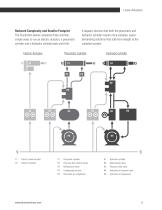
Linear Actuators Reduced Complexity and Smaller Footprint The illustration below compares three common, simple ways to run an electric actuator, a pneumatic cylinder and a hydraulic cylinder back and forth. It appears obvious that both the pneumatic and hydraulic cylinder require more complex, spacedemanding solutions that add more weight to the complete system. Electric Actuator Pneumatic Cylinder Hydraulic Cylinder —o <||| H1 P2 P2 E1. Electric linear actuator P1. Pneumatic cylinder P2. One-way flow control valves P3. Bidirectional valve H3. Pressure relief valve H4. Hydraulic oil...
Open the catalog to page 9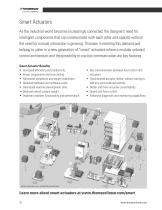
Smart Actuators As the industrial world becomes increasingly connected, the designer’s need for intelligent components that can communicate with each other and operate without the need for manual interaction is growing. Thomson is meeting this demand and helping to usher in a new generation of “smart” actuators where a modular onboard control architecture and the possibility to use bus communication are key features. Smart Actuator Benefits • Increased efficiency and productivity. • Fewer components and less cabling. • Minimized complexity and easier installation. • Reduced hardware and...
Open the catalog to page 10
Linear Actuators Traditional vs. Smart Systems Traditional System Each actuator is controlled by the host individually. By using control boxes, switches, sensors and position feedback devices, the host controls and keeps track of each actuator. Bus Communication System All actuators speak to the host control over the same bus, and each actuator does what it is commanded to and reports back when done or if something goes wrong. Synchronization System The host control runs one actuator, which becomes the master. The other actuators follow the master as slaves without having to communicate...
Open the catalog to page 11
Applications Lifting Devices, Fork Lifts, Driver Cabins and other Material Handling Vehicles • Cabin ergonomics are improved with seat adjustments, and individual, user-defined settings are pre-programmed for quick changes. • Engine throttle control is more precise and responsive, improving fuel consumption and the user experience. • Actuators assist in opening hoods and doors, and adjusting mirrors and ladders. Combines and other Agricultural Vehicles • Electromechanical actuation is ideal for hard-to-reach places that may require complex control to function. • Integrated electronics allow...
Open the catalog to page 12All Thomson Industries catalogs and technical brochures
-
Electrak® HD
36 Pages
-
A12C10A5-12M0BN-DEE
3 Pages
-
A12C10A5-12M0BH-DEE
3 Pages
-
A12C05A5-06M0BH-DEE
3 Pages
-
A12C10A5-10M0BN-DEE
3 Pages
-
HD12B017-0150LXX2MMSD
4 Pages
-
HD12B017-0100SYN2MMSD
4 Pages
-
HD12B017-0100LXX2MMSD
4 Pages
-
HD12B017-0250SYN2MMSD
4 Pages
-
HD12B017-0250LXX2MMSD
4 Pages


